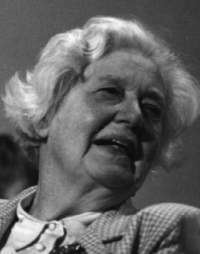Forgotten Liberal heroes: Nancy Seear
Listen to Liberal Democrats make speeches and there are frequent references to historical figures, but drawn from a small cast. Just the quartet of John Stuart Mill, William Gladstone, David Lloyd George, David Penhaligon corner almost all of the market. Some of the forgotten figures deserve their obscurity but others do not.
Charles James Fox’s defence of civil liberties against a dominating government during wartime or Earl Grey’s leading of the party back into power and major constitutional reform are good examples of mostly forgotten figures who could just as well be a regular source of reference, quotation and inspiration as the traditional quartet. So in this occasional series I highlight some of the other figures who have been unjustly forgotten.
Technically born Beatrice Nancy Seear, but known by her middle name, Nancy Seear in her time was one of the most prominent female politicians for the Liberals and then Liberal Democrats. She had a formidable grasp of detail, an impressive speech-making ability and a recurrent sense of fun.
Born in Croydon just before the First World War, in 1913, she also saw close up the horrors of the rise of Nazism during her time in Germany in the 1930s – an experience that she later gave as one of her three reasons for being a Liberal Democrat. During the Second World War she worked at the Ministry of Aircraft Production, and moved on the London School of Economics, initially as a Reader in Personnel Management, where she stayed until her death in 1997.

Seven times an unsuccessful general election candidate, starting in Hornchurch in 1950 and ending in Wakefield in 1970, she always finished third but finally made it to Parliament when she was created a life peer in 1971. That elevation, combined with the death two years earlier of Lady Violet Bonham Carter, meant she was the party’s most high profile female campaigner for a long period of time.
She was not a campaigner in the community politics sense, for she never put down deep roots in any of the constituencies she contested. Instead, she relied heavily on the power of oratory to motivate and sway people. That was a skill well deployed in the more fruitful environment of the House of Lords, party conferences and meetings. Her campaigning enthusiasm also led her into a huge number of voluntary organisations, with many posts held at different times.
Olly Grender’s account of her experience of Nancy Seear during the revelation of Paddy Ashdown’s affair in 1992 is typical of Seear’s no-nonsense enthusiasm for the cause:
All the senior men in the party hid, quite literally, in their offices. We were getting slaughtered on air with no one to talk for the party. I sent a grovelling message to the elderly Baroness Nancy Seear, Economist, Titan, Good Egg, who stormed into the Press Office and announced loudly in her best Margaret Rutherford tones, “my dear I have a past and I don’t know many people who don’t; now which studio do you want me to go into first?”
She was full of pointed, effective rhetoric, once deriding cynicism as the lazy person’s excuse for ignorance, yet retaining a good humoured approach to politics. Her advice to one Liberal (Liz Barker) on how to decide whether or not to attend different meetings was simply, “Always go if there is food”.
Her expertise in personnel and economic issues made her a regular and respected contributor to economic debates in the Lords. In 1981 she chaired the Lord’s Select Committee looking at unemployment.
Nancy Seear was wont to be rather critical of the feminist movement, but was an energetic campaigner for equal pay and had a time as President of the Fawcett Society. In 1972 she introduced a bill on pay discrimination that played an important part in the campaign which secured the 1975 Equal Pay Act. The Times reflected this in its praise in 1972: “Her works, on equal pay and opportunities, are for ever either being quoted, looked up or written down”.
In 1984 Nancy Seear became leader of the Liberal Party in the House of Lords, just before the introduction of television coverage of the Lords’s proceedings brought greater public prominence to the main figures in the Lords. It was a speech of hers that was the first to be televised from the Lords.
Lady Seear also became a regular on shows such as BBC1′s Question Time and a favourite of its audiences with her witty put-downs of far younger fellow panellists. Her humour was less in evidence when she once turned to John Prescott on one TV show, telling him to “Shut up!” – but such was her formidable character, that it worked.
A strong supporter of the SDP / Liberal Party merger in 1988, she happily stood aside to let Roy Jenkins become the leader of the new Liberal Democrat party in the Lords. Instead, she was his deputy until her death in 1997, just a few days before the party’s major electoral leap forward.
As Roy Jenkins put it at the time of Nancy Seear’s death: “She was a devoted servant of Liberalism, a speaker of spontaneous force and a personality of peculiar sweetness and generosity”.
David Rendel when selecting Nancy Seear as one of his Liberal heroes for the Journal of Liberal History No.23, wrote:
Nancy was, above all, a great liberal. Someone who regarded the state with the suspicion it deserves. Someone whose prime focus was helping people to achieve their full potential, to lead their own path in life as they would wish to. But Nancy coupled her intellect with an undying self-belief and a practical determination to see liberalism in action. She worked tirelessly in election campaigns and in the House of Lords.
The tributes paid to her in the Lords on her death are recorded in Hansard here.
For other posts in this series see my Forgotten Liberal Heroes page.